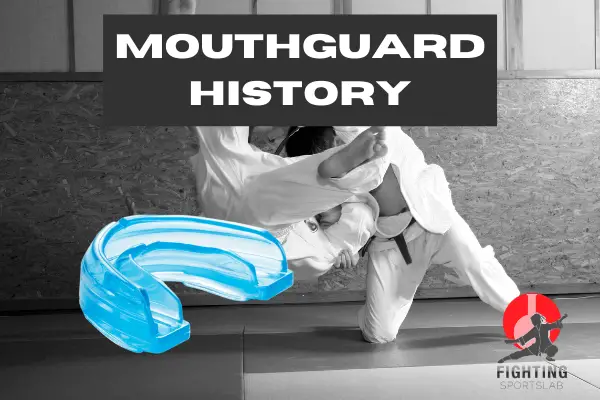If you are curious to know if you can use the mouthguard in judo, you are in the right place. In this article, we will see if the mouthguard is used in judo, and all that you have to know about the mouth guard.
Is a mouthguard used in judo? In general, the mouth guard on Europe and Asia is not used, opposite the USA wherein the majority of cases is used. Regarding the competition by regulation that you can find here International (IJF), there aren’t any rules that specify the violation of the mouthguard’s use. So in general, by regulation, you can use the mouth guard also in competitions.
Now it is time to go more in-depth to see, why some judoka use mouthguard and other not, we will know the material used to build a mouthguard and much more, so let’s go.
Is it wrong to wear a mouthguard in judo?
No, in general, you can wear the mouth guard in judo and is not a bad idea, especially if you are coming from others sports, and wearing a mouthguard can help you to feel more secure, as your previous sports, in the way to perform better in judo too.
In most cases, judo is not a sport that can damage your teeth, so you don’t have to worry too much.
What sports should you wear a mouthguard?
Other than judo in other sports, the use of a mouthguard is essential.
The sports included are:
- football
- soccer
- boxing
- basketball
- field hockey
- ice hockey
- gymnastics
- skateboarding
- in-line skating
- cycling
- volleyball
- softball
- wrestling
If you have already practices or are going to practice in this category of sports, mouthguard use is required. As we can see, the mouth guard is used on sports where a sudden jarring movement to the face jaw can be possible.
More in details, the mouth guard is mandatory for in collision sports such as football, hockey, and boxing where there is a high chance of collision, while for a sport that there is a minimal possibility of an incident like basketball, baseball, softball, wrestling, soccer, and volleyball, you can choose if wear or not.
What is the use of wearing a mouthguard?
If you are considering wearing a mouth guard, in the following sentences, I will encourage you to use it.
The mouth guard is usually made of plastic material, and it is used to prevent oral injuries to the teeth, mouth, cheeks, tongue, and jaw.
What injuries can the mouthguard protect against?
- chipped or broken teeth
- fractured crowns or bridgework
- lip and cheek injuries
- root damage to the teeth
- fractured jaws, and concussions
As you can see, if you wear the mouth guard in judo or any of your activity that you can consider dangerous for your teeth,
Can mouth guard damage teeth?
No, the correct use of a mouthguard can only bring you satisfactory results. Anyway, the only problem you can encounter is when you don’t wear the mouth guard properly.
My advice is to check if you are wearing the correct types of mouthguards and the right size for you.
The damage of a non-correct wearing of a mouth guard is limited to your gems.
Consideration must be done regarding the mouthguard’s cleaning procedure because when it comes to cavities and gum disease, the main culprits are bacteria, and the mouthguard can be considered if not correctly cleaned aggregation of bacteria.
Some advice to keep your mouthguard clean are :
- Wash the mouthguard with fresh water
- When you do not use it, keep it in the case that you received when you bought it.
- Keep the mouthguard away from humidity because, in humidity space, you can find bacteria.
- Once per week, do a deep cleaning.
- Not use hot water while washing your mouthguard. Otherwise it the hot water can compromise the material and change the shape of your mouthguard.
- Brush your teeth before wearing the mouthguard.
- Do not let it in an open area; if you are not using your mouthguard, keep in the case.
How is the mouthguard born?

The mouth guard was born in non-determinate years, but the first prototypes of mouth guard were born thanks to boxing, where some boxers made by their own the firsts rudimental mouth guard.
This mouth guard was made of different materials like wood, cotton, tape, sponge.
During the years, the attributions of the invention of a mouth guard are referred to different people, but a similar prototype of the mouthguard of nowadays was sawed in 1921 championship fight between Jack Britton and Ted “Kid” Lewis.
After years and years of not attention about the mouth guard, dentist notice that the 30 % of the injury of the contact sport was caused by damage to the teeth.
After this period, the American Dental Association (ADA) began researching mouth guards and soon promoted their benefits to the public, and in 1960 the ADA promoted the advice to wear mouth guards for all contact sports.
These were a short history of the mouthguard; for more details about history reefers to Wikipedia.
If you read until here probably, you are seriously interested to know more about the mouthguard, and probably now you want to warn also on your judo section.
If yes, now you will take a look at the different types of mouthguards that you can use for judo.
Types of mouth guard for martial arts
Nowadays, we are not in the same situations as the boxers of athletes of years ago where they were usually to war small piece of wood or other things to protect their teeth.
Likely to the technology and the discovery of new material, we can choose from the different types of a mouthguard.
More in particular
-
Stock or ready-made
This type of mouthguard is the most inexpensive and usually are sold in every sporting stores, with and at a very low price.
Anyway, depending on our mouth can bring difficulty while breathing, and in general, the dentists do not recommend their use.
-
Mouth adapted or “boil and bite”
This type of mouthguard can also be found in different sporting stores, and in general, it guarantees better protection.
The material used to build the boil and bite mouthguard is thermoplastic.
To use this type of mouth guard, you must put the mouth guard into hot water to soften, and then place it in the mouth in order to adapt to your shape
-
Custom-made
The costume-made mouth guard is used for the majority of the case by professionals, and it is made by a dental office or a professional lab.
The cost of the custom-made mouthguard is higher than the other type, but they will offer you the best protection and the best comfort of the other types already discuss before.
Conclusion
The use of a mouthguard is compulsory in some sports, while in others you can make your decision.
If you are practicing judo, and you are thinking about the use of a mouth guard or not, read the advance carefully that a mouthguard can give to you.
My other advice is to wear it if you feel more secure. Otherwise, it can compromise your performance during your training or match of judo.
